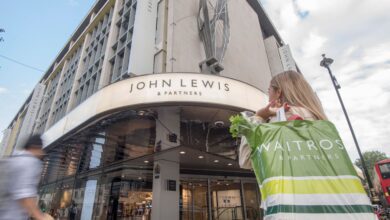Four things we learned from the John Lewis’ latest results
Retail Sector breaks down four of the major talking points from the latest John Lewis results

John Lewis held a partnership call with shareholders and members of the press after it revealed it returned to profit for the first time in four years posting a pre-tax profit of £42m before exceptional items for the year ended 27 January 2024. This success came off the back of a return to retail above everything else.
In the call partnership chair Sharon White and a number of other c-suite officials from the company discussed the decision to not pay a staff bonus for the third year in a row, future job cuts and its investment in Waitrose.
Here are four things we learned.
Unashamedly focused on retail
The biggest point of note from the call was the emphasis that the company put on its retail arm and how important it was in the group’s turnaround. CEO Nish Kankiwala vowed to focus “unashamedly” on retail following the results.
This focus on retail goes against the original turnaround strategy laid out by Sharon White which had initially been centred around diversifying the business including build-to-rent plans, more on this later.
Overall, the focus on retail has seemed to work. The partnership’s sales rose 1% to £12.4bn whilst the company’s total revenue jumped 2% to £10.8bn. Alongside this, Waitrose sales increased by 5% to £7.7bn while its trading operating profit rose £170m up to £1.06bn.
The company also invested £111m in productivity improvements across the year showing its commitment to improving.
Waitrose openings
Another sign that the partnership is commiting to retail is its plans for Waitrose. The company is planning to open a number of new stores, although it would not confirm how many and where they would be. It will also be a mix of traditional Waitrose stores as well as smaller convenience stores showing the company’s intention to invest.
Alongside new stores the partnership is also trying to improve its offering in its existing stores. The partnership is set to refurbish around 80 stores as part of a £1bn investment. It is also trialling a number of things particularly in its store in Sudbury, London.
“We believe we’ve got lots and lots of opportunities to reach new customers and you can see from our record customer numbers, there’s plenty of demand out there. We’ve got some more test stores this year and there are all sorts of changes involved, making the shops brighter and lighter, more engaging for customers, revamping and doubling down on our counter and our service proposition,” said James Bailey, executive director.
No staff bonuses
The big point of contention with the latest results came after the company decided not to pay bonuses to its staff for the third time in four years. The reason given for this is that the company is focusing on base pay, in which the company has invested around £160m in over the past year. White also claimed that bonuses were not in the forefront of employees minds and that they want the business to invest in growth and focus on base pay.
“We know what partners really want because we have all of us out in shops, and we’re always in forums, we’re always polling partners and what they say to us is two things. Please invest more for growth, please invest more in the business we want more investment in brands, we want more investment in our stores and please do more on pay.
“What you’ve seen today is that through the hard work of partners and those who’ve done an absolutely extraordinary job in the last 12 months, we are meeting the priorities that partners have said are the best for growth and pay,” she said.
There seems to be no timeline for when bonuses may return. In 2021 staff were paid bonuses once profit exceeded £150m and its debt ratio fell below 4x but White refused to commit to any goal for when bonuses may return.
“There isn’t a timeline. What we’ve tried to sort of really explain today is we own the business as partners and so when we’re taking decisions for the long term as business owners, the two priorities that we that we know are coming through from our partners and customers are investing for growth, great service, better technology, investment in our story state and in pay. So as we start to generate more cash we’ll be able to invest more in the business,” said White.
Job cuts
Another staff issue from the call was impending job cuts. The company cut “a few hundred roles” last year which saved the company around £88m and it is looking for similar numbers this year despite the healthy financial outlook.
It has been reported that the partnership is looking to cut around 11,000 jobs in the next five years but White and Kankiwala would not be drawn on any targets or whether the positive finances would lessen the need for lay-offs.
“There’s no target. Reduction in roles is definitely one of the parts of the refresh plan that is becoming simpler and more flexible as a business and that’s starting to bear fruit. Inevitably, that will mean that there’s less need for some roles over the coming years. But there’s no target for jobs.
“I think you look at the results for the last year, the fact that we’ve become simpler and more flexible and the fact that we’re growing customer numbers is broadly what’s generated the additional cash to invest back in the business for growth. There’s an opportunity for us across the business to become simpler, more flexible. The more cash we generate, the more we’re able to invest for growth, the more this becomes a virtuous circle for our customers and our partners,” White explained.








